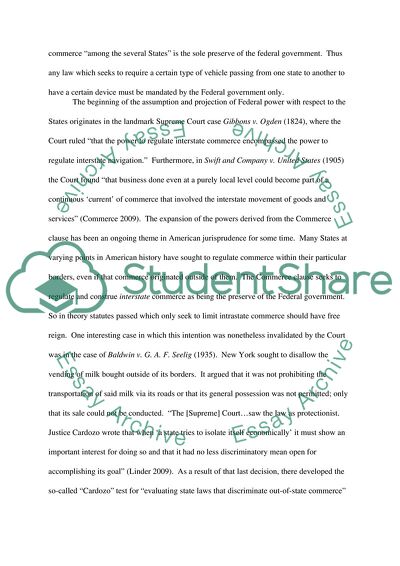
- Home
- Free Samples
- Premium Essays
- Editing Services
- Extra Tools
- Essay Writing Help
- About Us
- Studentshare
- Subjects
- Miscellaneous
- State Of Confusion
State Of Confusion - Essay Example

- Subject: Miscellaneous
- Type: Essay
- Level: Masters
- Pages: 4 (1000 words)
- Downloads: 0
- Author: ryleelehner
Extract of sample "State Of Confusion"
Given that Tanya is making the complaint from one state about a statute in another would on its face seem to be a dispute justiciable by Federal court because Mrs. Trucker clearly has standing. Article VI of the Constitution clearly states that “[t]his Constitution, and the Laws of the United States which shall be made in Pursuance thereof; and all Treaties made, or which shall be made, under the Authority of the United States, shall be supreme Law of the Land; and the Judges in every State shall be bound thereby, any Thing in the Constitution or Laws of any state to the Contrary notwithstanding” (Find 2010).
This is the famous Supremacy Clause. In areas where power has been specifically given to the Federal government, its writ is supreme with respect to State Laws or courts. A further great source of power for the Federal government, particularly in the twentieth century, has been derived from the so-called Commerce Clause. It states: “The Congress shall have the Power To lay and collect Taxes, Duties, Imposts and Excises…To regulate Commerce with foreign Nations, and among the several States, and with Indian Tribes;…” (Find 2010).
These two clauses combined are germane to the subject at hand. Federal Law and courts trump State law and courts. More importantly, the Commerce clause states that the regulation of commerce “among the several States” is the sole preserve of the federal government. Thus any law which seeks to require a certain type of vehicle passing from one state to another to have a certain device must be mandated by the Federal government only. The beginning of the assumption and projection of Federal power with respect to the States originates in the landmark Supreme Court case Gibbons v.
Ogden (1824), where the Court ruled “that the power to regulate interstate commerce encompassed the power to regulate interstate
...Download file to see next pages Read MoreCHECK THESE SAMPLES OF State Of Confusion
Toxicological
State of confusion paper
Representation of Gender In the film Ma Vie en Rose
Analysis of Hamlets Madness
Globalization - The Theory of Hybrid Entity
State of Confusion: Law Case
Advance Care Directive Policies
Use of B-Type Truck Hitch by Trucks Using State of Confusions Highways

- TERMS & CONDITIONS
- PRIVACY POLICY
- COOKIES POLICY